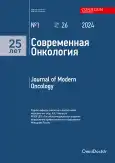Intensity of repeated disability due to brain malignancies in the female population in Moscow for 2017–2021
- 作者: Zaparii S.P.1, Potapenko O.I.2
-
隶属关系:
- Main Bureau of Medical and Social Expertise in Moscow
- Main Bureau of Medical and Social Expertise for the Moscow Region
- 期: 卷 26, 编号 1 (2024)
- 页面: 88-91
- 栏目: Articles
- URL: https://journals.rcsi.science/1815-1434/article/view/258578
- DOI: https://doi.org/10.26442/18151434.2024.1.202627
- ID: 258578
如何引用文章
全文:
详细
Aim. To study the rates of repeated disability due to brain malignancies in the female population in Moscow for 2017–2021 and develop measures to prevent morbidity and reduce disability from these causes.
Materials and methods. The study was continuous; the information database of the Single Automated Vertically Integrated Information and Analytics System for Social Security Medical Assessments of the Main Office of Medical and Social Assessment was used based on the results of a re-examination of female patients with brain malignancies (BM) at the Bureau of Medical and Social Expertise for 2017–2021.
Results. The study of repeated disability of the female population due to brain malignancies in Moscow for 2017–2021 showed an increase in the absolute number and percentage of persons repeatedly recognized as disabled; the predominance of persons of working age (63.8%) with an upward trend; the predominance of disabled people of group II with a tendency to increase in absolute number, proportion and level; the predominance of disabled people of groups II–III among women of working age and groups I–II among persons older than working age.
Conclusion. The study of repeated disability of the female population due to brain malignancies in Moscow for 2017–2021 showed an increase in the absolute number and percentage of persons repeatedly recognized as disabled; the predominance of persons of working age (63.8%) with an upward trend; the predominance of disabled people of group II with a tendency to increase in absolute number, proportion and level; the predominance of disabled people of groups II–III among women of working age and groups I–II among persons older than working age. It indicates the need for preventive measures, screening for early detection of brain malignancies, primarily of the working-age population, with the expansion of high-tech approaches to patients, observing routing at all stages of medical rehabilitation with the introduction of modern technologies.
作者简介
Sergey Zaparii
Main Bureau of Medical and Social Expertise in Moscow
编辑信件的主要联系方式.
Email: zapariy.sp@mse77.ru
ORCID iD: 0000-0002-4636-1130
D. Sci. (Med.)
俄罗斯联邦, MoscowOlga Potapenko
Main Bureau of Medical and Social Expertise for the Moscow Region
Email: o.i.potapenko@yandex.ru
ORCID iD: 0009-0008-3953-0312
SPIN 代码: 8065-5523
Head of the 5th Expert Team
俄罗斯联邦, Moscow参考
- World Cancer Declaration Progress Report 2016. World Health Organization, 2016.
- Чиссов В.И. Модернизация онкологической службы – важнейшее направление системного совершенствования онкологической помощи населению России. Терапевтический архив. 2012;84(10):4-8 [Chissov VI. Modernization of the oncological service is the most important area of systematic improvement of oncological assistance to the population of Russia. Terapevticheskii Arkhiv (Ter. Arkh.). 2012;84(10):4-8 (in Russian)].
- Johansen D, Stocks T, Jonsson H. Metabolic factors and the risk of pancreatic cancer: a prospective analysis of almost 580,000 men and women in the Metabolic Syndrome and Cancer Project. Cancer Epidemiol Biomarkers Prev. 2010;19(9):2307-17.
- Проклова Т.Н., Щепин В.О., Чичерин Л.П., и др. Стойкая нетрудоспособность населения Российской Федерации, анализ и оценка региональных особенностей. Проблемы социальной гигиены, здравоохранения и истории медицины. 2020;28(4):555-9 [Proklova TN, Schepin VO, Chicherin LP, et al. The persistent disability of population in the Russian Federation: analysis and assessment of regional characteristics. Problemi socialnoi gigieni, zdravookhranenia i istorii meditsini. 2020;28(4):555-9 (in Russian)]. doi: 10.32687/0869-866Х-2020-28-4–555-559
- Convention on the Rights of the Disabled: General Assembly resolution 61/106 of 13.12.2006. Bulletin on international acts. 2013; 7.
- World Health Organisation. Rehabilitation 2030: A Call for Action. Available at: http://www.who.int/rehabilitation/CallForActionRU.pdf. Accessed: 12.03.2018.
- World Health Organisation. Other dimensions of the NCD crisis: from mental health, ageing, dementia and malnutrition to death son the roads, violence and disability. Available at: http://www.who.int/publications/10-year-review/ncd-other-dimensions/ru/index8.html. Accessed: 12.03.2018.
补充文件







